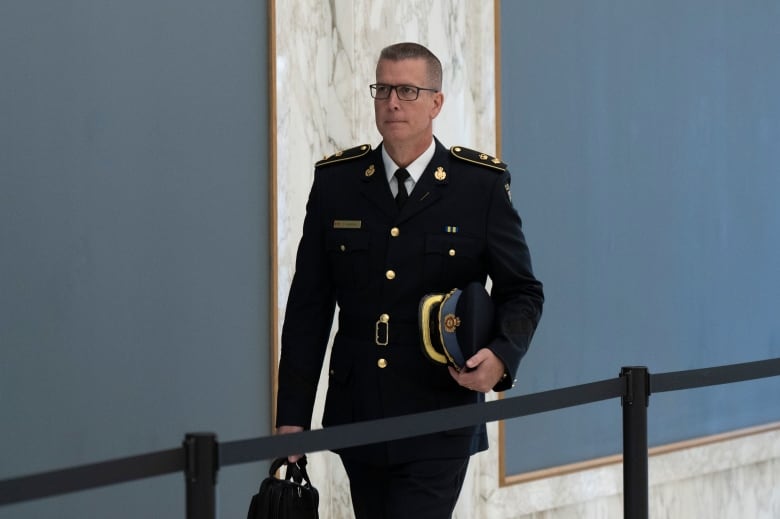
A senior officer with the Ontario Provincial Police described a tense and sometimes distrustful relationship between his team and the Ottawa police during the Freedom Convoy protests last winter.
Carson Pardy, a now-retired OPP chief superintendent, ran what was called the integrated planning cell, which was set up to help the Ottawa Police Service (OPS) during the Freedom Convoy.
According to documents filed Friday with the Public Order Emergency Commission, Pardy was pulled into a meeting on Feb. 8 with the head of the OPP and other senior officials. There he was told his team’s mandate was to support Ottawa police and help rebuild trust with the OPS.
“The public had lost trust in OPS because it perceived that the Freedom Convoy protesters were going unchecked,” says a summary of the evidence Pardy gave the Public Order Emergency Commission.
The inquiry is looking into the federal government’s use of the Emergencies Act to quell the protests that gridlocked parts of downtown Ottawa for weeks.

Pardy said that during the Feb. 8 briefing, he was told “there were fundamental leadership concerns in OPS.”
Pardy said OPP Supt. Craig Abrams, who testified at the commission Thursday, told him that the Ottawa police already had dealt with a resignation due to “unrealistic expectations.”
“He noted that on a few occasions during the Freedom Convoy, significant OPS officers walked away due to unbearable stress. During the interview, he observed that OPS switched event commanders on three occasions during the Freedom Convoy,” says a summary of that Feb. 8 briefing.
Cardy said he was told by his superiors that while the OPS was asking for another 1,800 officers, it lacked an operational plan to deploy them.
Disagreements between OPP and OPS
Pardy described to commission lawyers what he called a “passionate” exchange between his team, OPS Chief Peter Sloly and OPS officers on Feb. 9.
“During the meeting, Chief Sloly told the cell that if police could fix Ottawa, they would also fix the nation. Chief Superintendent Pardy and his team did not agree,” says a summary of that call.
Pardy said he and his team joined a virtual call on Feb. 12 and heard Sloly addressing his command team disrespectfully.
Pardy said he offered to leave the call so that Sloly could address his team privately, but Sloly declined.
“Chief Sloly made it apparent to Chief Supt. Pardy that Chief Sloly did not trust his command team and subject matter experts,” the commission heard.
Pardy is the third OPP member to testify this week about the dire state of relations with OPS during the convoy protest.
On Thursday, an operations commander spoke to what he saw as chaos and dysfunction within the Ottawa Police Service in the early days of the protest.
OPP Supt. Abrams said that, early on during the convoy protests, he was told by a senior Ottawa police officer that the OPS didn’t know how to resolve the situation.
Abrams said that during a call on Jan. 31, the Monday after the first weekend of protests, then-deputy OPS chief Steve Bell said the service was planning for a protracted event and was looking at a “four-week sustainability plan.”
That claim was made both in documents filed to the commission Thursday and in Friday testimony.
Abrams said that came as a surprise as he was hoping to resolve the situation faster.
“To hear that there was a plan that didn’t look like it would have a resolution until at least four weeks was surprising to me,” Abrams said Friday.
“I believe that’s the conversation where he basically stated, ‘We don’t know how to resolve this.'”